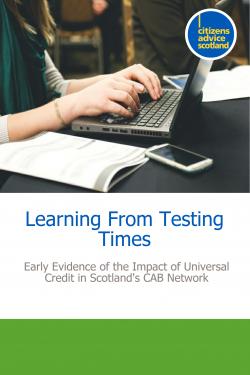
This report presents many of the Universal Credit cases that Scotland’s CAB network has advised on during the first year of the rollout. At this stage, it is a only a small fraction of the people who will eventually receive Universal Credit – single jobseekers with ‘simple’ claims. However, the evidence allows us to start to identify some of the challenges that may stand in the way of the success of Universal Credit and to make recommendations for how these obstacles can be overcome. These challenges fall into three groups – design challenges, transitional and administrative challenges and future challenges.
Universal Credit is the most ambitious change to the social security system since its establishment. It will eventually encompass people at a wide range of different points of their lives and in different circumstances – in work, out of work, in sickness and in health, when single, with children, and in a range of situations where they are vulnerable and in need of financial support, and will eventually be received by over 800,000 people in Scotland.
Citizens Advice Scotland has always supported the principles behind Universal Credit. Simplifying the complicated benefits system would help thousands of people who visit a CAB for advice on what support they might be entitled to. And ensuring that work always pays and is seen to pay is crucial to making sure people maximise their income.
After a delayed introduction, between February 2015 and April 2016 Universal Credit has been gradually rolled out across Scotland. At this point, with a couple of exceptions, it is only available for single jobseekers without children or complex circumstances. This represents a small fraction of people who will eventually receive Universal Credit. However, it does mean that we can start to see how well it works in practice.
Design challenges include:
-
A six-week wait to receive a first payment of Universal Credit
-
Challenges caused to claimants by a single monthly payment
-
The effect of Universal Credit sanctions
-
Challenges of a primarily online system when around 20% of future users struggle to use the internet
Administrative and transitional challenges include:
- Confusion caused by running Universal Credit in parallel with an existing legacy benefits system
-
Early administrative issues causing delays in claims being processed
-
Issues with the Universal Credit Helpline
-
Teething problems with the Real Time Information system from employers
Future challenges include:
-
The impact of numerous changes made to elements of Universal Credit by the UK Government’s 2015 Budget and Autumn Statement
-
The unknown impact of in-work conditionality for claimants
-
The challenges and opportunities caused by devolution of some administrative flexibilities to the Scottish Government